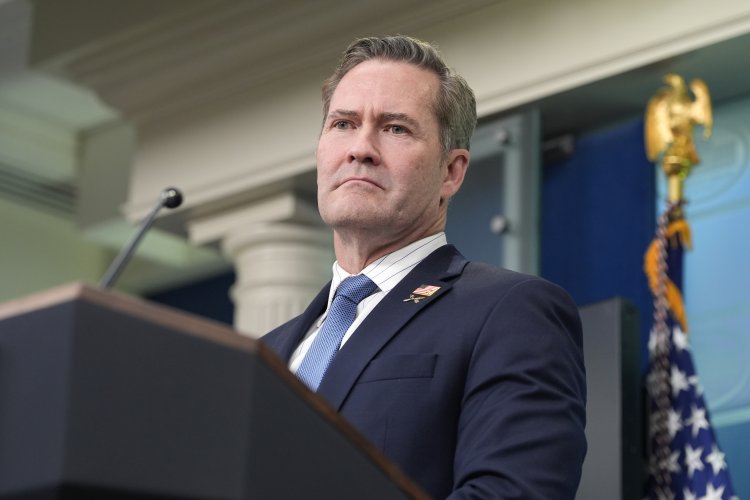'Sloppy, Reckless': Use of Signal, Gmail by Waltz Revives Concerns Over White House Communications
Democratic leaders from important House committees are renewing their calls for the resignation of national security adviser Mike Waltz.

On Wednesday, congressional Democrats revisited the matter as new media reports emerged. National security adviser Mike Waltz, already under scrutiny for adding a journalist to the Yemen chat, allegedly discussed sensitive topics via apps that are not supervised by the government.
The Washington Post reported Tuesday that Waltz and one unnamed senior aide conducted official business using personal Gmail accounts, conveying messages related to schedules and work documents — information that could be exploited by foreign intelligence services.
Less than a day later, PMG disclosed that Waltz’s team had created at least 20 Signal group chats to manage official activities concerning Ukraine, China, and Gaza, where they repeatedly exchanged sensitive information.
Democratic lawmakers are outraged and are renewing their demands for accountability regarding the Trump administration’s handling of communications and a reform of government communication policies. There are concerns that using Signal and Gmail for official matters may breach federal records-keeping laws. Publicly available apps also pose a greater risk of interception for foreign adversaries such as China and Russia compared to secure government communication tools.
"In under 10 days, we’ve heard about journalists added to unclassified chats and sensitive data being shot around on personal emails," tweeted Senate Intelligence Committee Vice Chair Mark Warner. "And now we’re hearing there’s dozens more chats. It’s a never-ending parade of sloppy, reckless incompetence."
These new issues arise amid widespread criticism following a report from The Atlantic, which detailed conversations between President Donald Trump’s senior officials—including Waltz, Vice President JD Vance, Director of National Intelligence Tulsi Gabbard, CIA Director John Ratcliffe, and Defense Secretary Pete Hegseth—regarding the timing and location of U.S. airstrikes in Yemen. Waltz inadvertently included The Atlantic’s editor-in-chief, Jeffrey Goldberg, who subsequently published the messages after Trump officials denied sharing classified information.
Jim Himes, chair of the House Intelligence Committee, asserted in a statement on Wednesday that Waltz’s use of a Gmail account for emails and calendar invites indicates that "the Signal chat debacle was not, as the Trump administration claimed, one embarrassing mistake."
"In actuality, it’s emblematic of the gross hypocrisy and incompetence of an administration, which has consistently dodged accountability for breaking the rules," Himes commented.
Congressional criticism of Waltz intensified after PMG's report revealed additional Signal group chats. House Oversight and Reform ranking member Gerry Connolly remarked on Twitter that Waltz "needs to be as far away from our nation’s secrets as humanly possible."
This is not the news the Trump administration had hoped for as it tried to move on from the Signal scandal. Gabbard and Ratcliffe faced extensive questioning regarding their use of Signal during pre-scheduled congressional hearings last week, with both insisting they had not transmitted classified information and claiming that Signal was commonly used in government. Officials involved in the Yemen Signal chat have also sought to deflect blame onto other group members.
The White House is eager to put the controversy behind it. White House spokesperson Karoline Leavitt told reporters on Monday, "The case has been closed here at the White House," adding that "there have been steps made to ensure that something like that can obviously never happen again, and we're moving forward."
In response to The Post's reporting, Brian Hughes, a spokesperson for the National Security Council, described it as "the latest attempt to distract the American people from President Trump’s successful national security agenda that’s protecting our nation."
Hughes confirmed that Waltz "received emails and calendar invites from legacy contacts on his personal email and cc’d government accounts for anything since Jan. 20 to ensure compliance with records retention." He refrained from commenting on whether sensitive information was shared due to a lack of access to the Post's messages but emphasized that Waltz "has never sent classified material over his personal email account or any unsecured platform."
However, using a personal Gmail account to discuss sensitive government information—even if not classified—is risky, as those email servers lack the robust safety features of government systems. Users affiliated with the U.S. government are often targeted by hackers.
"The White House keeps saying this issue is ‘case closed’ but it is anything of the sort," stated House Homeland Security Committee ranking member Bennie Thompson. He noted that Gmail is “far less secure than Signal” and characterized the situation as indicative of "amateur hour in the Trump White House."
While both Signal and Gmail have robust internal security features, experts argue neither is completely secure from hacking, and there are safer communication methods available for government use.
"Communication systems approved for government officials meet security requirements and government records management requirements," explained Lorrie Cranor, a security and privacy technology professor at Carnegie Mellon University’s CyLab. "Attackers frequently target government officials and attempt to gain access to their messages as well as break into their accounts so that they can impersonate them. So, appropriate security is important."
Not all lawmakers share the same level of concern regarding security vulnerabilities related to publicly available apps, with some Republicans asserting that the issue is overstated. Sen. Mike Rounds, chair of the Senate Armed Services Committee’s cyber subcommittee, stated, "I don’t have a problem with anybody using Gmail as long as they’re not putting sensitive or classified material on it."
Rep. Andrew Garbarino, chair of the House Homeland Security Committee’s cyber subcommittee, commented at a conference that while the use of Signal "wasn’t great," he was confident the administration would be "a lot more careful" moving forward.
Other lawmakers contended that, beyond security issues, the situation illustrates a lack of accountability from Republicans and the administration. Trump has defended Waltz amid widespread bipartisan criticism of his handling of the Signal chat situation.
"When you think you’re invincible, you just become more and more reckless,” stated Rep. Eric Swalwell, ranking member of the House Homeland Security Committee’s cyber subcommittee.
Swalwell advocated for Democrats to hold administration officials accountable, even if this serves as a deterrent for future conduct.
"We’re not helpless as Democrats," he said. "Every week we’ve got different security officials, military officials testifying to Congress. We should lock them in to ask ‘are you using Signal, are you using Gmail, are you using anything but high-side communications for transmitting classified or sensitive information.’"
"If it’s not a deterrent, at least if we are in the majority, it would bring future accountability," he added.
Thomas Evans for TROIB News












